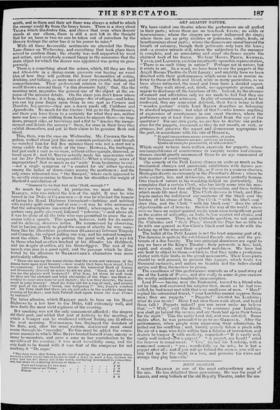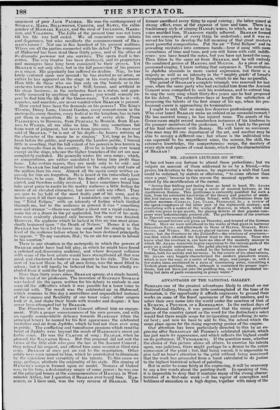JOIN BRAIIAM.
I regard BRAHAM as one of the most extraordinary men of the age. He has delighted three generations. He was the pupil of Lnozti, and sung ballads at the old Royalty Theatre, under the ma nagement of poor JACE PALMER. He was the contemporary of STORICE, MARA, BILLINOTON, CROUCH, and BANTI, the extin- guisher of MICHAEL KELLY, and the rival of INCLEDON, HARRI- SON, and VI GANONI. The.Lilla of the present time was not born till his life was half ended. We all remember some debuts and departures, hut who recollects the commencement of BRA- HAM'S career ? Not one in five hundred of his present auditors. Where are all the parties connected with his debut ? The composer
of Mahmoztd has been dead these thirty years, and of the other of its dramatis pers~ not one survives.. The opera itself is for- gotten. The very theatre has been destroyed, and its proprietors
and managers have long been consigned to their graves. Yet BRAHAM is not only alive, but in the full possession of his powers as a singer. His popularity has suffered no decline. Nay, he has Intel',' ventured upon new ground : he has started as an actor, or rather he has appeared on the stage in his every-day demeanour. How little do those who see him only on the boards or in the orchestra know what BRAHAM is ! Stitt; formal, and artificial in his stage business ; in the orchestra fixed as a statue, and appa- rently unmoved by anything that passes ; you would scarcely ex- pect to find the life of 'the Green-room. Yet such he is : wit, repartee, and anecdote, are never wanted when BRAHAM is present.
How varied have been the demands on his powers ! The King's Theatre, Drury Lane, Covent Garden, every concert-room in the metropolis, every theatre, every festival in the kingdom, has in turn put them in requisition. He is master of every style. From PALESTRINA to ROSSINI, from PURCELL to BISHOP, from HAN- DEL to WEBER, all are alike to him. He may sometimes fail from want of judgment, but never from ignorance. No man ever said of l3assaiam, " he is out. of his depth—lie knows nothing of the character of the music he is singing." Yet, long as he has been before the public, and especially the London public, I hazard little in asserting, that the full extent of his powers is less known in the metropolis than in the country. Here he is hardly ever heard except on the stage, whence the higher branches of the art are now completely excluded. He generally writes his own songs ; which, as compositions, are rather calculated to bring him profit. than fame. Like certain razors, they are made only to be sold : and hence Bamiam has bad regard rather to the capacity and taste of the million than his own. Almost all the opera songs written ex- pressly for him are forgotten. He is heard at the (miscalled) Lent Oratorios; to be sure. But there his finest efforts are not appre- ciated, and therefore coldly received. I have sometimes heard him take great pains to excite in his motley audience a little feeling for music of an elevated character, but never with any effect. They are sure to lay hold of the most faulty part of his song, and to lavish upon it all their applause. I remember, one night., his sing- ing " Total Eclipse," with an intensity of feeling which thrilled through me, but to the audience in general if, was " something new and strange ":--there was neither a shout nOr a rapid cadence: some ten or a dozen in the pit applauded, but the, rest of his audi- tors were evidently pleased Only because the song was finished. However, the applause which he lacked in this air was most abun- dantly bestowed upon " the Death of Nelson." Hence it is that Biomass has been led to lower his sonas and his singing to the level of the audience before whom he has been destined principally to appear. " 'Tis my vocation, Hal ; 'tis no sin for a man to labour in his vocation."
There is one situation in the metropolis in which the powers of Bamiala might have had full play, in which he might have found a polished and discerning audience, and where frequent collision with seine of the best artists would have strengthened all that was good, and chastened whatever was impure in his style. The Con- cert of Ancient Music he, of all men living, was the most fitted to adorn ; but it will hardly be believed that he has been wholly ex- cluded from it until the last year.
More than thirty years since, BRAHAM sprang, at a single bound, IC) the head of his profession. The invention of STEPHEN STORACE was tasked (in the opera written for his debut) to embody in one sung all the difficulties which it was possible for a tenor voice to contend with. The result was the celebrated air in Mahmoud, which remains to this day a marvellous and unparalleled instance of the compass and flexibility of one tenor voice : other singers look at it, and shake their heads with wonder and despair : it has never been attempted but. by BRAHAM. The Directors of the Ancient Concert offered him an engage- ment. With a proper consciousness of his own powers, and with an equally commendable delicacy towards HARRISON (then the principal -tenor) he named for his first appearance the celebrated recitative and air from Jephtha, which he had not then ever sung in public. The conflicting and tumultuous passions which rend the heart of J(phtha were beyond the reach of HARRISON'S sweet yet feeble voice. He was the CLAUDE of song ; Baasrasi, when he pleased, the SALVATOR ROSA. But this proposal did not suit the views of the little club who gave the law at the Ancient Concert ; they refused his request, and offered him some second or third-rate song. BRAHAM at once put . an end to the negotiation. Other orbits were soon opened to him, which he contributed to illuminate by the splendour and versatility of his talents. To this cause we may, perhaps, attribute the originality of his style. . His. singing of HANDEL'S songs is formed upon no model. • Ncsmus of Oxford was, in his time, a declamatory singer of some power ; he was one of the principal tenors at the commemoration of HANDEL in West- minster Abbey, but I question if BRAHAM ever heard him. HAR! RISON, as I have said, was the very reverse of BRAHAM. The former sacrificed every thing to equal voicing ; the latter aimed at strong •effect, even at the expense of tone and time. There is a. traditionary style of singing Haamtn'saairs; to which, as far as his voice :enabled him, HARRISON rigidly adhered. BRAHAM formed his own conception of every thing he undertook ; and it was res served for him to develop the full meaning of that great master's most powerful compositions. Put the air "Total Eclipse" and its preceding recitative into common hands—hear it sung with mere correctness of time and tuue, and you will listen with cold indiffes rove: you have heard the notes, but you have not heard the song. Then listen to the same air from BRAHAM, and he will embody the combined genius of HANDEL and MILTON. As a piece of im- passioned singing, I know nothing that surpasses it. The recitative in Jephth,a abounds in more varied expression, but there is a majesty as well as an intensity in the " mighty griefs" of Israel's champion, as portrayed by BRAHAM, which to me has no parallel. The period of BRAHAM'S complete triumph was reserved for last year, when the same party who had excluded him from the Ancient Concert were compelled to seek his assistance, and to entreat him to sing the very song which thirty-five years ago he had proposed for his debut. The subscribers have at length- the satisfaction of possessing the talents of the first singer of his age, when his pro- fessional career is approaching its termination. I ought to add, that no man less deserves professional enemies. Who ever heard BRAHAM make an unkind oran uncandidremark? He has assisted many ; he has injured none. The annals of the Green-room might record numberless instances of his kindness to the younger members of the profession. I own I look to the period of his, final retirement with dismay. He will leave no successor. One man may fill one department of the art, and another may be able to occupy a different one ; but where is the individual who can superadd to his magnificent voice, the science, the skill, the extensive knowledge, the comprehensive range, the Mastery of every style and species of vocal music, which are the Characteristics of BRAHAM?



















 Previous page
Previous page